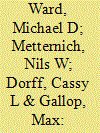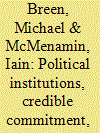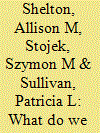|
|
|
Sort Order |
|
|
|
Items / Page
|
|
|
|
|
|
|
| Srl | Item |
| 1 |
ID:
126714


|
|
|
|
|
| Publication |
2013.
|
| Summary/Abstract |
Developing political forecasting models not only increases the ability of political scientists to inform public policy decisions, but is also relevant for scientific advancement. This article argues for and demonstrates the utility of creating forecasting models for predicting political conflicts in a diverse range of country settings. Apart from the benefit of making actual predictions, we argue that predictive heuristics are one gold standard of model development in the field of conflict studies. As such, they shed light on an array of important components of the political science literature on conflict dynamics. We develop and present conflict predictions that have been highly accurate for past and subsequent events, exhibiting few false-negative and false-positive categorizations. Our predictions are made at the monthly level for 6-month periods into the future, taking into account the social-spatial context of each individual country. The model has a high degree of accuracy in reproducing historical data measured monthly over the past 10 years and has approximately equal accuracy in making forecasts. Thus, forecasting in political science is increasingly accurate. At the same time, by providing a gold standard that separates model construction from model evaluation, we can defeat observational research designs and use true prediction as a way to evaluate theories. We suggest that progress in the modeling of conflict research depends on the use of prediction as a gold standard of heuristic evaluation.
|
|
|
|
|
|
|
|
|
|
|
|
|
|
|
|
| 2 |
ID:
126583


|
|
|
|
|
| Publication |
2013.
|
| Summary/Abstract |
This article tests systematically the effect of political structures on the credibility of sovereign debtors in advanced economies. It argues that power-sharing and party system polarization have important effects on long-term interest rates. Where collective responsibility is high and polarization is low, the market perceives a more credible commitment on the part of sovereign debtors. These arguments derived from the theory of credible commitments perform much better than alternative accounts of the politics of sovereign debt, namely a market preference for right-wing governments and more flexible polities. The principal data consist of a panel of 23 rich countries between 1970 and 2009. There are tests for robustness to a wider sample and a variety of different measurements.
|
|
|
|
|
|
|
|
|
|
|
|
|
|
|
|
| 3 |
ID:
126715


|
|
|
|
|
| Publication |
2013.
|
| Summary/Abstract |
This essay bridges the standard divide between traditional realist and critical IR theory by demonstrating their unity in the international thought of E. H. Carr. In recent times, numerous scholars have challenged Carr's mainstream disciplinary image as a traditional realist, seeking to dissociate him from realism and narrate him as a proto-critical theorist instead. However, this has implicitly reinforced the divide between the two perspectives and obscured their fusion in Carr's thought. In contrast, this essay does not deny Carr's realism, but rather reveals how it expressed a distinctly critical theoretical consciousness. Focusing primarily on his attacks on liberal statecraft and liberal historiography in, respectively, The Twenty Years' Crisis and What Is History? it demonstrates that his analyses manifested key critical theory elements, including anti-positivist epistemology, counter-hegemonic tendencies, Western Marxist ideology critique and sociology of knowledge, and a commitment to progressive human emancipation from self-imposed constraints.
|
|
|
|
|
|
|
|
|
|
|
|
|
|
|
|
| 4 |
ID:
126721


|
|
|
|
|
| Publication |
2013.
|
| Summary/Abstract |
Liberals have discovered the system level of analysis. Two somewhat competing strands of system-level liberal scholarship have emerged. The first emphasizes the system's normative dynamics and the democratic peace. The second has sought to conceive of capitalism as a property of the international system and theorize its effects. While a number of propositions and mechanisms have been identified, the literature has failed to develop an overarching account of system structure. Using Durkheim's distinction between mechanical and organic societies, and Waltz's tripartite definition of structure, this paper develops a liberal grand-theory that integrates these two strands of liberal systemic thinking. The theory generates a number of large propositions: the structure's dominant tendency is integration; it pushes states to specialize; and it induces a competitive normal politics. I also propose a typology of systems that vary according to liberal homogeneity and a liberal normative framework and mutual economic dependence, with important implications for the question of systemic stability. By way of conclusion, I offer a few thoughts on the value of grand-theorizing in International Relations.
|
|
|
|
|
|
|
|
|
|
|
|
|
|
|
|
| 5 |
ID:
126716


|
|
|
|
|
| Publication |
2013.
|
| Summary/Abstract |
Does political science research have something to add to the counterinsurgency strategy debate? Should the discipline even concern itself with debates over military doctrine and strategy? After conducting a thorough review of the extant empirical literature, we argue that the answer to both of these questions is yes. Evaluating the theoretical and empirical findings of the last two decades, we identify three dimensions of civil wars affecting who prevails: (i) state capacity, (ii) the effects of violence against civilians, and (iii) foreign intervention. Domestic armed conflicts are characterized not only by military struggles, but equally importantly by contests of legitimacy between incumbent and rebel visions for the state. We conclude that the analyses of COIN strategy cannot be divorced from assessments of state capacity and the role of external actors in the conflict. We thus see the academic literature as instrumental in adding to practitioners' perspectives by more clearly identifying what COIN strategies can be applied under state capacity and legitimacy constraints to facilitate peace through both population-centered (legitimacy) and insurgent-centered (battlefield effectiveness) strategies. Our analysis identifies points of consensus, but also highlights the gaps in our knowledge, which need attention from both academe and practitioners.
|
|
|
|
|
|
|
|
|
|
|
|
|
|
|
|
|
|
|
|
|